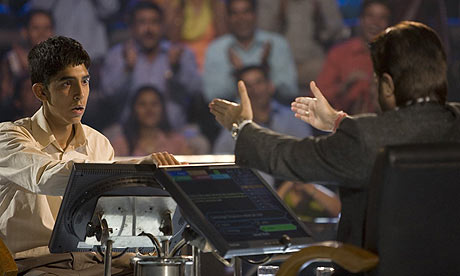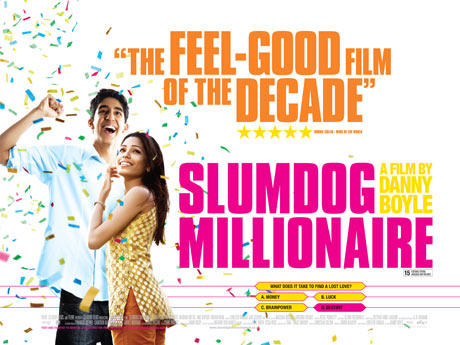
Slumdog Millionaire is clearly going to get a lot of coverage and analysis as it continues its triumphant march to glory, so there’s probably not a lot I can add.
The main thing that struck me about Simon Beaufoy’s script is how it remains coherent and constantly moving forward despite having a complex triple narrative.
The action unfolds in three main strands:
- Jamal, an 18-year-old orphan from the slums of Mumbai, is interrogated by the police, who think that he must have cheated somehow to reach the upper levels of India’s Who Wants to Be a Millionaire? These scenes are punctuated by;
- Jamal on the show, locked in a battle of wills with the sneering and smarmy presenter and facing the increasingly valuable questions.
- Following each question, we learn how Jamal came to know the answer by tracing the series of incidents from his turbulent childhood that have led him to appear on the show.
The success of the script isn’t all down to structure. The developing characters of Jamal, his thuggish brother Salim and his lost childhood sweetheart Latika are beautifully drawn through a series of little gestures and set-ups that are paid off almost perfectly at the end.
I know we’re always quick to criticise directors who have done something to spoil a screenwriter’s beautiful creation, but Danny Boyle (and his team) have taken the script and turned it into a fantastic piece of cinema.
The editing (by Mark Digby) and the soundtrack (by AR Rahman) are particularly effective, giving the film the energy it needs to depict life in the teeming ‘maximum city’ of Mumbai.
 The one concern I had was more to do with the marketing of the film – particularly the ubiquitious claim from a review that it’s “the feelgood movie of the decade”.
The one concern I had was more to do with the marketing of the film – particularly the ubiquitious claim from a review that it’s “the feelgood movie of the decade”.While it’s probably not giving too much away to say that there’s eventually a happy ending, even that comes at a tragically high price.
Along the way we see police brutality and torture, savage and murderous communal violence, the mutilation of children for profit, underage prostitution and almost inconceivable poverty.
During the ‘Industry Practice’ section of my MA course, development and sales consultant Tom Strudwick was keen to stress the importance of genre in marketing.
In particular, he warned against using generic conventions in marketing to mislead the audience so they expect one thing and end up with another – something that does terrible damage to the film’s ‘playability’ (the long and lucrative theatrical life it can gain through word-of-mouth).
Hopefully Slumdog Millionaire is now picking up sufficient pedigree (ie critical acclaim and awards) to find its audience as a very strong piece of drama. It’d be a shame if the film suffered because of misguided emphasis on the cutesie teen-love aspect.
Link one: Programme notes for last week’s BFI preview and Q&A with Danny Boyle, including quite a few quotes from Simon Beaufoy on writing the script (The Q&A didn’t provide too much stuff from a screenwriter’s point of view that hasn’t been in the various interviews with DB).
Link two: A Creative Screenwriting podcast interview with Simon Beaufoy.


No comments:
Post a Comment